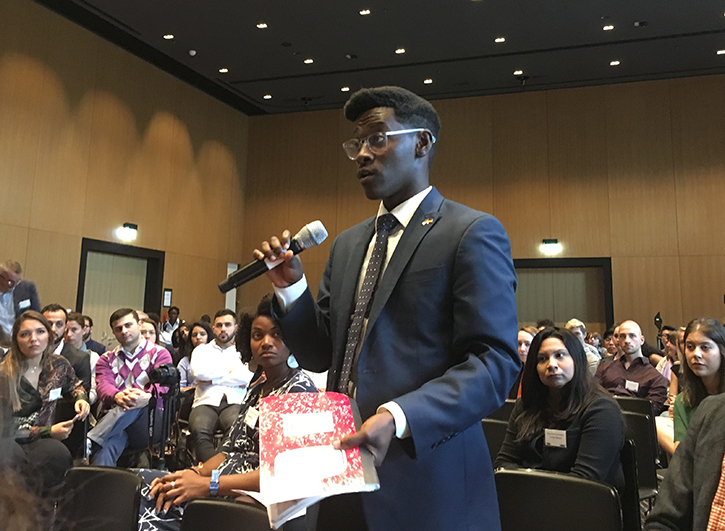
Mason alumnus Desmond Moffitt speaks at the Fulbright Diversity Conference in Berlin. Moffitt's experience as a Fulbright grantee and English Teaching Assistant in Germany, prompted him to push for greater support from Fulbright for diverse scholars teaching overseas. Photo provided.
For LaNitra Berger, director of the Office of Fellowships in George Mason University’s Honors College, one of the university’s prime directives is to produce graduates who are “ready to act.”
So when Fulbright scholar and Honors College alumnus Desmond Moffitt, BA History ’17, recommended to the Fulbright Program that cohorts of diverse scholars teaching overseas need more support to navigate and thrive in the countries to which they are assigned, Berger was understandably proud—especially of the result.
Partially in response, the U.S. State Department, which sponsors the Fulbright Program, and the German-American Fulbright Commission held a diversity roundtable in Berlin in May. The event brought together current U.S. Fulbright scholars to brainstorm ways to help the State Department and European Fulbright Commissions address those concerns.
Moffitt, who as a Fulbright grantee was an English Teaching Assistant in Dresden, Germany, said cultural differences he experienced led to conflicts with administrators and fellow teachers in the first school in which he taught. He said he was a target of racial harassment from immigrant students in his second school.
“You don’t just take the grant and run,” Berger said. “You go there, and when you see something that needs to be addressed, you step up and take the lead.”
What Moffitt said he saw was a need for all scholars, whether they be of color, of different sexual orientations or physical abilities, to receive more information and resources from the Fulbright Program to navigate the prejudices and harassment they might encounter in their host countries.
To help make his case, he engaged Berger, who has worked in the field of international education since 2005 and has been a highly respected mentor and Fulbright Program Advisor since 2010. He also reached out to other Fulbright scholars and alumni, the German-American Fulbright Commission, the State Department and other European Fulbright commissions.
“What we’re trying to do is make the approach more holistic when they talk about diversity,” said Moffitt, who is pursuing a master’s degree in education policy at Columbia University and is a project coordinator for the Institute for Urban and Minority Education. “We’re talking about religion, economic status, race, creed, gender, physical ability. There are so many definitions to diversity. If we can get to a point where the program is a multitiered approach, I think we are accomplishing something.”
.jpg)
LaNitra Berger and Desmond Moffitt at the Fulbright Diversity Conference in Berlin.
In March, Moffitt helped put together a cultural sensitivity workshop of working Fulbright scholars of diverse backgrounds to discuss their experiences. In July, Berger led a webinar for the Fulbright Program on navigating personal identity abroad in which three Fulbright alumni—including Mason graduates Matthew Robinson, BA History ’15, and Anjana Radhakrishnan, BS Economics ’15—told their stories.
And as part of a Fulbright Diversity Conference held in September to celebrate German-American Fulbright Commission diversity initiatives, Moffitt reported on the work of his task force that is developing recommendations to better promote diversity and equity in the Fulbright Program. Berger was a featured speaker and discussion facilitator at the conference.
“They were leaders at the program,” Mary Kirk, director of the State Department’s Office of Academic Exchange Programs, said of Moffitt and Berger. “We are very pleased with that connection with George Mason. The leadership of the campus is very evident, and we are using that to the advantage of the program.”
Kirk stressed that diversity is a top priority for the State Department, and that “significant resources” have been put into diversifying the Fulbright applicant pool.
For the past decade, she said, the State Department has been coordinating efforts to increase and strengthen Fulbright recruitment and the participation of minority-serving institutions, including historically black colleges and universities, Hispanic-serving institutions and tribal colleges. In addition, it has sought to encourage greater diversity among applicants from across the country.
Even so, feedback such as what she received from Berger, Moffitt and other Fulbright scholars about their experiences was critical to ensuring that Fulbrighters, once recruited, receive adequate support.
“Our primary focus for the State Department is the safety and security and successful scholarship experience of our American Fulbrighters,” Kirk said. “We always seek to learn from the experience of alumni to point out areas where we can consider new support systems for the program.”
“The fact that they are committing resources to this is very significant,” Berger said. “I would say this is one of the most significant changes that has happened in a very long time.”
